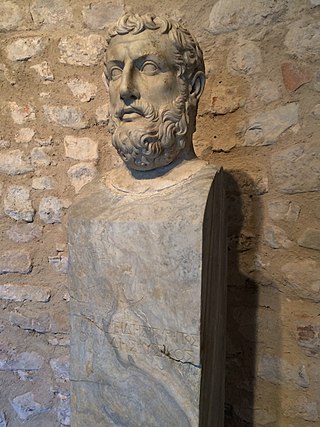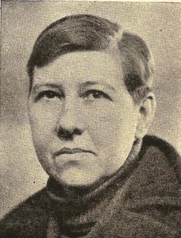
Anaxagoras was a Pre-Socratic Greek philosopher. Born in Clazomenae at a time when Asia Minor was under the control of the Persian Empire, Anaxagoras came to Athens. In later life he was charged with impiety and went into exile in Lampsacus.
Fire is one of the four classical elements along with earth, water and air in ancient Greek philosophy and science. Fire is considered to be both hot and dry and, according to Plato, is associated with the tetrahedron.

Democritus was an Ancient Greek pre-Socratic philosopher from Abdera, primarily remembered today for his formulation of an atomic theory of the universe. Democritus wrote extensively on a wide variety of topics.

Empedocles was a Greek pre-Socratic philosopher and a native citizen of Akragas, a Greek city in Sicily. Empedocles' philosophy is best known for originating the cosmogonic theory of the four classical elements. He also proposed forces he called Love and Strife which would mix and separate the elements, respectively.

Heraclitus was an ancient Greek pre-Socratic philosopher from the city of Ephesus, which was then part of the Persian Empire. He exerts a wide influence on ancient and modern Western philosophy, including through the works of Plato, Aristotle, Hegel, and Heidegger.

Parmenides of Elea was a pre-Socratic Greek philosopher from Elea in Magna Graecia.
Pre-Socratic philosophy, also known as Early Greek Philosophy, is ancient Greek philosophy before Socrates. Pre-Socratic philosophers were mostly interested in cosmology, the beginning and the substance of the universe, the inquiries of these early philosophers spanned the workings of the natural world as well as human society, ethics, and religion. They sought explanations based on natural law. Their work and writing has been almost entirely lost. Knowledge of their views comes from testimonia, i.e. later authors' discussions of the work of pre-Socratics. Philosophy found fertile ground in the ancient Greek world because of the close ties with neighboring civilizations and the rise of autonomous civil entities, poleis.

Solon was an archaic Athenian statesman, lawmaker, political philosopher, and poet. He is one of the Seven Sages of Greece and credited with laying the foundations for Athenian democracy. Solon's efforts to legislate against political, economic and moral decline resulted in his constitutional reform overturning most of Draco's laws.

In Greek mythology, Phorcys or Phorcus is a primordial sea god, generally cited as the son of Pontus and Gaia (Earth). Classical scholar Karl Kerenyi conflated Phorcys with the similar sea gods Nereus and Proteus. His wife was Ceto, and he is most notable in myth for fathering by Ceto a host of monstrous children. In extant Hellenistic-Roman mosaics, Phorcys was depicted as a fish-tailed merman with crab-claw legs and red, spiky skin.
Ancient Greek philosophy arose in the 6th century BC. Philosophy was used to make sense of the world using reason. It dealt with a wide variety of subjects, including astronomy, epistemology, mathematics, political philosophy, ethics, metaphysics, ontology, logic, biology, rhetoric and aesthetics. Greek philosophy continued throughout the Hellenistic period and later evolved into Roman philosophy.
Diogenes of Apollonia was an ancient Greek philosopher, and was a native of the Milesian colony Apollonia in Thrace. He lived for some time in Athens. He believed air to be the one source of all being from which all other substances were derived, and, as a primal force, to be both divine and intelligent. He also wrote a description of the organization of blood vessels in the human body. His ideas were parodied by the dramatist Aristophanes, and may have influenced the Orphic philosophical commentary preserved in the Derveni papyrus. His philosophical work has not survived in a complete form, and his doctrines are known chiefly from lengthy quotations of his work by Simplicius, as well as a few summaries in the works of Aristotle, Theophrastus, and Aetius.
Critias was an ancient Athenian poet, philosopher and political leader. He is known today for being a student of Socrates, a writer of some regard, and for becoming the leader of the Thirty Tyrants, who ruled Athens for several months after the conclusion of the Peloponnesian War in 404/403.

Pherecydes of Syros was an Ancient Greek mythographer and proto-philosopher from the island of Syros. Little is known about his life and death. Some ancient testimonies counted Pherecydes among the Seven Sages of Greece, although he is generally believed to have lived in the generation after them. Others claim he may have been a teacher of Pythagoras, a student of Pittacus, or a well-traveled autodidact who had studied secret Phoenician books.

Hermann Alexander Diels was a German classical scholar, who was influential in the area of early Greek philosophy and is known for his standard work Die Fragmente der Vorsokratiker. Diels helped to import the term Presocratic into classical scholarship and developed the Diels–Kranz numbering system for ancient Greek Pre-Socratic texts.
Walther Kranz was a German classical philologist and historian of philosophy.
Theagenes of Rhegium was a Greek literary critic of the 6th century BC from Rhegium, in Magna Graecia.
Brontinus of Metapontum, Magna Graecia, was a Pythagorean philosopher and a friend and disciple of Pythagoras. Alcmaeon dedicated his works to Brontinus as well as to Leon and Bathyllus. Accounts vary as to whether he was the father or the husband of Theano.
Fragmenta Philosophorum Graecorum (FPG) is a three-volume collection of fragments of ancient Greek philosophers. It was edited by the German scholar, F.W.A. Mullach, and published in Paris by the Didot family between 1860 and 1881. FPG was the first general collection of fragments of Presocratic philosophy, but also included later material including that of Cleanthes. The volumes contain the original Greek texts with Latin translations and commentary also in Latin.

Diels–Kranz (DK) numbering is the standard system for referencing the works of the ancient Greek pre-Socratic philosophers, based on the collection of quotations from and reports of their work, Die Fragmente der Vorsokratiker, by Hermann Alexander Diels. The Fragmente was first published in 1903, was later revised and expanded three times by Diels, and was finally revised in a fifth edition (1934–7) by Walther Kranz and again in a sixth edition (1952). In Diels–Kranz, each passage, or item, is assigned a number which is used to uniquely identify the ancient personality with which it is concerned, and the type of item given. Diels–Kranz is used in academia to cite pre-Socratic philosophers, and the system also encompasses Sophists and pre-Homeric poets such as Orpheus.
According to the 6th century BC mythographer Acusilaus, Hesione was the daughter of Oceanus, the wife of Prometheus and the mother of Deucalion. That she was a daughter of Oceanus and wife of Prometheus, was also repeated in Aeschylus' Prometheus Bound.











